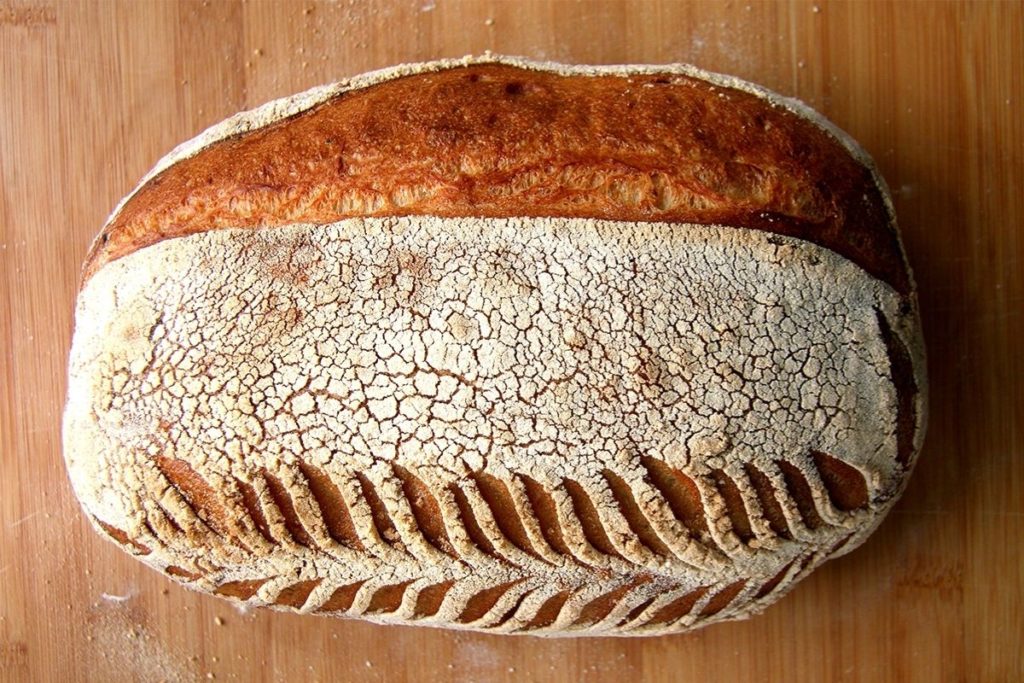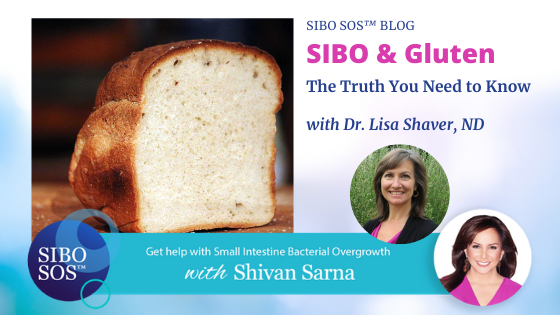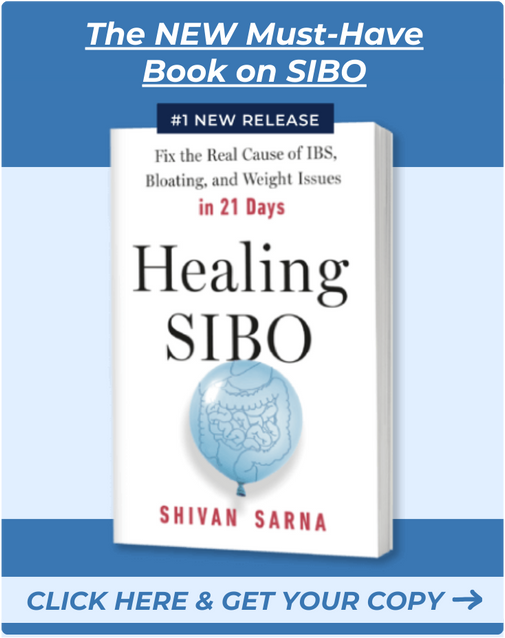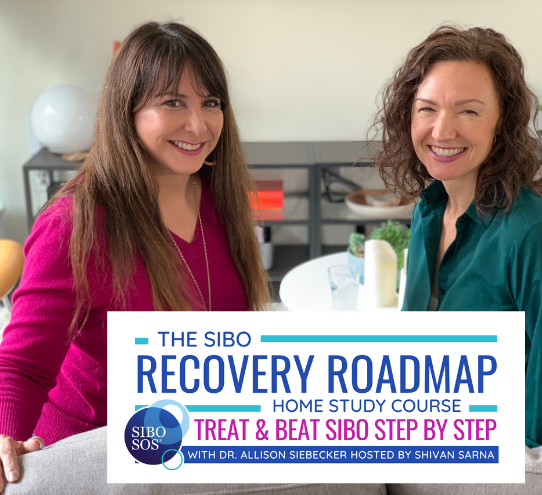Should you commit to a gluten-free diet if you have SIBO?
It’s one of the most common questions we hear.
Some practitioners think only those with Celiac Disease need to be gluten-free.
Others think gluten is evil and should be avoided by everyone – especially those with gut issues like Irritable Bowel Syndrome (IBS) or Small Intestine Bacterial Overgrowth (SIBO).
So what is the truth about gluten and SIBO?
Today, I’m going to explain Celiac Disease, non-Celiac gluten sensitivity, their connection to SIBO, and (hopefully!) empower you to make the right decision for you about gluten. This blog post is based on information I have learned from interviewing Dr. Lisa Shaver, ND.
What Is Gluten?
Gluten is a protein found in grains like wheat, rye, barley, and spelt. It also is a common contaminant in grains that don’t naturally contain gluten, like oats. Gluten is a large molecule with two sub-molecules: gliadin and glutenin.
Many foods are naturally gluten-free – even some grains like rice, corn, and quinoa. Other foods, like oats, can be gluten-free if they are properly handled. But gluten can’t be removed from gluten-containing grains like wheat or rye. Gluten-containing grains must be avoided 100% by gluten-free people.
What Is Celiac Disease?
Celiac Disease is an autoimmune condition that causes damage to the small intestine. When someone with Celiac Disease eats gluten, their immune system reacts by damaging the small intestine.
About 40% of the population has the genes for Celiac Disease. You can have the genetic test easily with just a cheek swab. But, having the gene for Celiac doesn’t mean you necessarily have the disease. Only about 1% of the population actually has Celiac Disease.
But, about 5% of people who DO have Celiac Disease don’t have the gene for it, either.
Basically, this means having the gene for Celiac isn’t a sure way to know if you do or don’t have Celiac Disease. Instead, you need to be tested for Celiac Disease specifically using either a blood or stool test.
For a blood test to be accurate, you have to be eating gluten regularly. For the stool test, you don’t have to be currently eating gluten for the results to be accurate.
If you DO have Celiac Disease, you must stop eating gluten. You need to stay on a gluten-free diet for the rest of your life.
Beyond Celiac Disease
If only 1% of the population has Celiac Disease, does that mean only 1% of us need to avoid gluten?
It’s not quite that simple.
Doctors once believed that either you had Celiac and must avoid gluten, or you could tolerate it without any adverse symptoms. What the evidence shows, however, is that someone can have non-celiac gluten sensitivity, and that can cause a whole range of symptoms.
As mentioned earlier, gluten has two sub molecules, gliadin and glutenin. As a molecule itself it’s already very large and hard to digest for a vast majority of people.
While you may not think you have a gluten sensitivity, you really need to test for it to be sure. Cyrex is one laboratory that does offer the non-celiac gluten sensitivity panel along with the celiac panel. It may be an extra cost, but arming yourself with information could definitely be worth it, especially if your results are positive.
The Role of Gluten When It Comes to SIBO
SIBO, celiac disease and non-celiac gluten sensitivity appear to intertwine. While you may eliminate gluten, if you’re still heavily eating carbs, you may still have symptoms.
In many instances, patients who were celiacs, or who had non-celiac gluten sensitivity who eliminated gluten, may have felt great for a long time. But after eating gluten-free foods like cookies, English muffins, tortillas and gluten-free cakes, or even rice, sorghum, millet and nut flours like almond or cashew flour, found that they still had bloating and diarrhea.
If you have SIBO, indulging in a gluten-free carb-heavy diet might be the cause of a whole list of uncomfortable symptoms: burping, reflux, heartburn, abdominal pain, stomach pain, gurgling, distention, bloating, gas, diarrhea, constipation, alternating diarrhea constipation, and painful bowel movements.
This shows that it isn’t just gluten, but processed grains in general that people with SIBO really struggle with in terms of digesting them properly.
Another issue is mis-diagnosing a gluten intolerance or Celiac Disease as SIBO.
Gluten & Leaky Gut
Why doesn’t everyone with the gene for Celiac Disease actually develop the condition?
It’s because for Celiac Disease to develop, leaky gut must also be present. If you have the gene for Celiac Disease but never develop leaky gut, you will not develop Celiac Disease.
Sounds great, right?
The only problem is that leaky gut is incredibly common and can be triggered by everything from medications, to environmental toxins, to diet (yes, eating gluten!), and stress.
Should I Go Gluten Free?
Even with all we know today, there still isn’t a one-size-fits-all answer to this question.
However, there are certain steps you should take BEFORE eliminating gluten. If you eliminate gluten without testing for Celiac first, for example, you will never know if you have just a sensitivity or a potentially life-threatening autoimmune condition.
And even if you decide to go gluten-free, replacing gluten-containing foods with GF replacements may make your SIBO symptoms WORSE!
Do you have questions? Need more information about gluten, SIBO, and leaky gut?
Watch Masterclass with Dr. Lisa Shaver About Gluten
The Tricky Trinity – Demystifying Gluten, SIBO, & Leaky Gut Taught by Dr. Lisa Shaver, ND
Masterclass On-Demand – Unlimited Access
Dr. Shaver is a naturopathic physician, licensed acupuncturist, and holds a master’s degree in Oriental Medicine. She specializes in Celiac Disease and non-Celiac gluten sensitivity (NCGS).
In this all-new Masterclass, Dr. Shaver will explain the way gluten impacts the digestive system, the different ways a gluten intolerance can manifest, and how gluten intolerance can interplay with Small Intestine Bacterial Overgrowth and leaky gut.
And the best part? We’re offering a special price for this Masterclass: just $27. This information is critical to healing (and so misunderstood) so we are lowering the price to make it accessible to as many people as possible.














29 thoughts on “SIBO & gluten: the truth you need to know with Dr. Lisa Shaver”
Is it ok to be gluten free before SIBO testing, or will it skew the test results?
Hi Rebecca – being gluten free shouldn’t impact SIBO test results as long as you follow the prep diet for you SIBO test properly.
this is wonderful information like hidden pieces of the puzzle coming together to make sense of all the symptoms that doctors can’t make sense of, thank you so much!!!
Thank you, Rose. Glad you find it helpful.
Karen
SIBO SOS Team
….i can see how the information is not coming freely : for exemple
3 time the question about the cinammon is been asked
the ansew is not coming clearly and evec avoid ..
with cinamon ?? coming from where ? what makes the diference between common and medical ? many of us have allready essentiel oil is that the proper medical one …?
Hi Rosine,
Ceylon is the best. Here’s a link to a brand we like.
Frontier Ceylon Cinnamon
Karen
SIBO SOS Team
I am glad that other people have these same problems as I do! I have seen some weight loss with meal spacing, especially after gaining 13 pounds – and then losing 6 – from eating 8oz of sprouted hummus and raw green beans within 36 hours. I am still suffering from the bloating!
How can I find a SIBO practitioner that my insurance covers?
That’s a hard one. Here’s a link to our list of vetted practitioners: sibosos.com/practitioner-list You would have to reach out to their individual practices to learn about their insurance requirements.
Good luck.
Karen
SIBO SOS Team
Excellent information many thanks
Thank you, Ben!
Karen
SIBO SOS Team
Are there some advances to increase gluten tolerance? How can one test if
they have become tolerant over time? I’ve heard this is possible as the gut
gets healthier and one has given up the dairy or another irritant for a lot of
years.
Is there a test for gluten sensitivity to know if undetected damage is being done?
I hear the Anti-Gladin test isn’t enough
Are the HLA genes for gluten intolerance (not Celiac genes) by 23andme a good
indicator to go by for refraining?
to give it up?
BJ,
So sorry you are dealing with gluten intolerance. Dr. Siebecker discussed it in yesterday’s Q&A. Did you happen to join us? Check out Dr. Siebecker’s website at siboinfo.com It is a great resource. I hope you can find some answers there.
Karen
SIBO SOS
How much molybdenum is recommended? I’d like to give this a try but have no ideas as to dosage. This would be to help with the onions/garlic/broccoli/cruciferous veggies situation.
Hi Julie,
See my response to Rachna…. I took 1 tablet 3x a day and completed 2 bottles. I was prescribed the brand Biotics Research Mo-Zyme Forte™ – Molybdenum 150 mcg, for Liver Support, Detoxification, Essential Trace Element, Healthy Metabolism, Antioxidant Support 100 Tablets. This supplement isn’t something you should take without a practitioners advice. Your body produces molybdenum naturally, so by taking it when not needed, could create toxicity in the body. Just be mindful and check in with your doctor first.
Karen
SIBO SOS Team
I have been gluten free since 2009. I was losing bone density. I have been able to build back that density through diet and lifestyle. Now at 60 years of age, I still am completely free of any on-going pharmaceuticals. It is easy to eliminate gluten. I could have ended up on a ton of pharmaceuticals without ever addressing the real issue. I feel so blessed!
Hi Rebecca,
Thanks for sharing your comments.
Karen
SIBO SOS Team
Can cheating on fod map diet , aka eating gluten 1-2 x periodically really be that detrimental to treatment or is that a myth ? For example sometimes I can eat gluten with less pain then rice ! But I’d it feeding the bacteria again for that 1 x
Thank you Shivan for this post. It’s very helpful now with the holidays coming and the colder weather. I feel drawn to more comfort foods and that includes looking at packages of frozen gluten free waffles and such. Luckily, I have passed them over. I often wonder about oatmeal too. It really doesn’t agree with me. I feel bloated from it. Sometimes, I try cream of rice cereal. Any comment about that one?
Thank you LIsa and Shivan for this post. It’s very helpful to me. I’ve been diagnosed with SIBO. I’ve often wondered about oatmeal and why it doesn’t agree with me. Do you think Cream of Rice cereal is a good option? I find myself drawn to more comfort foods now with the holidays coming and the colder weather. I seem to do pretty well with yams or sweet potatoes. The suggestion about the supplement makes sense. Also, I”m staying away from gluten free frozen foods like waffles and things that are tempting but really don’t work well either. Good wishes to you both for the holidays.
Thank you
Thank you!
Karen
SIBO SOS Team
Molybdenum is essential to push the sulfur pathway. As a supplement, it comes in a variety of forms. I like to try a liquid molybdenum first. Three drops provides 75 mcg, and that’s perhaps all that is needed. The drops allow for individualization of treatment, going up with a more sulfur-rich meal, less or none in a low or non-sulfur containing meal.
Sulfur rich foods include the Brassica family (cruciferous vegetables) such as broccoli, cauliflower, kale, Brussels sprouts, cabbage, bok choy. Then there are eggs & meat, nuts and of course onions & garlic and other allium family (leeks, scallions and the white part of the green spring onion).
Also have your water tested for sulfur levels. And pharmaceutical medications and some supplements contain sulfur as well, so make sure you explore all the areas where sulfur may be creeping into your body.
Thanks, Dr. Shaver. This is great to know!
Karen
SIBO SOS Team
my naturopath just suggested i take molybdenum and it was nice to see it listed in this blog. I’ll see how it works
I’ve taken it Sharon and got good results from it. Hope you have the same or better outcome.
Karen
Karen, if you don’t mind me asking, how much molybdenum did you take, how often and for how long?
Hi Rachna,
I don’t mind responding at all. I took 1 tablet 3x a day and completed 2 bottles. I was prescribed the brand Biotics Research Mo-Zyme Forte™ – Molybdenum 150 mcg, for Liver Support, Detoxification, Essential Trace Element, Healthy Metabolism, Antioxidant Support 100 Tablets. This supplement isn’t something you should take without a practitioners advice. Your body produces molybdenum naturally, so by taking it when not needed, could create toxicity in the body. Just be mindful and check in with your doctor first.
Karen
SIBO SOS Team
Sharon,
See Dr. Shaver’s comments.
Good luck,
Karen
SIBO SOS Team
I am confused. When I eat gluten free noodles/pasta, my abdominal pain, gas, and bloating is far worse than ever! I can’t eat gluten, and apparently, I can’t eat gluten free! My symptoms are worse eating eggs, which are also recommend for SIBO.
I’ve read that the true cause of SIBO is resistant streptococcus. How do I heal, when I can’t eat?Probiotics vs no probiotics; it’s so confusing.
Help!
Hi Sherri! Wow… are you working with somebody right now to get those contradictions in check? It does sound overwhelming when you put it that way! Plus, you need someone to help direct you to do some testing so you can get an intervention strategy in place. It is almost sounding to me like your food options are SO limited.